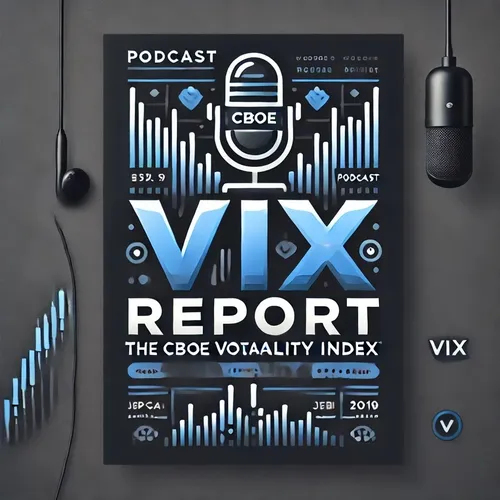"Declining Volatility: A Closer Look at the Recent Cboe Volatility Index (VIX) Trends"
- Author
- QP-1
- Published
- Mon 12 May 2025
- Episode Link
- https://www.spreaker.com/episode/declining-volatility-a-closer-look-at-the-recent-cboe-volatility-index-vix-trends--66051253
### Recent Analysis of the Cboe Volatility Index (VIX)
As of May 8, 2025, the Cboe Volatility Index (VIX), an essential barometer for gauging expected market volatility, was reported at 22.48. This figure reflects a noticeable shift from the VIX value reported on the previous trading day, May 7, 2025, which stood at 23.55. This transition represents a decline of approximately 4.54%, highlighting a decrease in market volatility expectations over the period.
The VIX is a critical measure for investors and financial analysts as it embodies the market's expectations for volatility over the next 30 days, derived from S&P 500 index options prices. Often referred to as the "fear index," the VIX provides insights into investor sentiment and market stability. A drop in the VIX suggests a reduction in anticipated market fluctuations, which typically corresponds to growing market confidence and potentially fewer risks perceived by investors.
#### Factors Contributing to Recent VIX Movement
Several factors may have contributed to the recent reduction in the VIX:
1. **Market Sentiment:** A positive shift in market sentiment often leads to lower VIX values. With reduced volatility expectations, it's conceivable that market participants are reacting to optimistic developments, be they economic, geopolitical, or financial.
2. **Economic Indicators:** When economic indicators point toward stability and growth, such as robust employment data or moderate inflation, the consequence is often diminished market anxiety, leading to a lower VIX.
3. **Central Bank Policies:** The actions and announcements of central banks, like interest rate changes or quantitative easing measures, can influence market confidence. Suppose recent central banking decisions have assured markets of continued economic support. In that case, it may alleviate volatility fears, thus playing a role in the VIX's decline.
4. **Global Events:** The absence of significant geopolitical tensions or adverse global events can lead to a more relaxed market outlook. A stable international political landscape, devoid of crises or conflicts, tends to correlate with reduced market volatility.
#### Implications of the Current VIX Value
The recent decrease in the VIX hints at a more confident market outlook. It indicates that investors might foresee a period of stability and predictability in the markets, at least in the short term. While the VIX is not a predictor of market direction (i.e., whether prices will rise or fall), it is a useful tool for understanding general market expectations and sentiment
